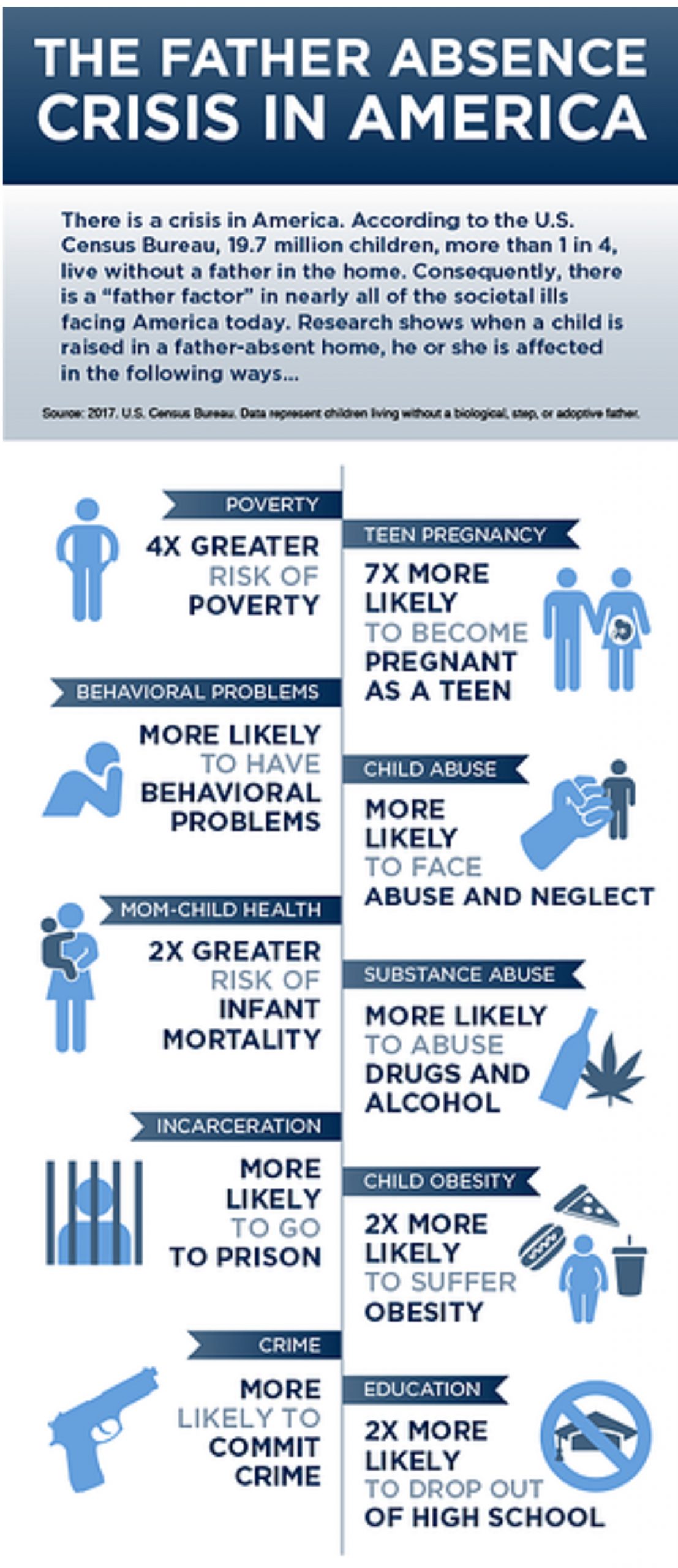At Success Made to Last, we believe in every individual’s ability to create change and it ALL starts in the home. For us, the most important place to contribute to is www.fatherhood.org. The absence of fathers is costing us culturally and preventing individuals from achieving their best version. The statistics are undeniable.
Hear the podcast with Dr. Joel Myers, founder of Accu-Weather and get a clear understanding of the power and importance in fatherhood.
Listen to the podcast with John Francis, founder of Father’s Eve. This is an exploding community of fathers that are bonded together, one night a year. It’s a movement that you can become a part of …honoring your own Father and creating togetherness around your singular most important role in life…being a Father.
We know that the absence of fathers has a profound impact on society. The statistics are mind boggling:
- 85% of youth who are currently in prison grew up in a fatherless home. (Texas Department of Corrections)
- 7 out of every 10 youth that are housed in state-operated correctional facilities, including detention and residential treatment, come from a fatherless home. (U.S. Department of Justice)
- 39% of students in the United States, from the first grade to their senior year of high school, do not have a father at home. Children without a father are 4 times more likely to be living in poverty than children with a father. (National Public Radio)
- Children from fatherless homes are twice as likely to drop out from school before graduating than children who have a father in their lives. (National Public Radio)
- 24.7 million children in the United States live in a home where their biological father is not present. That equates to 1 in every 3 children in the United States not having access to their father. (National Public Radio)
- Girls who live in a fatherless home have a 100% higher risk of suffering from obesity than girls who have their father present. Teen girls from fatherless homes are also 4 times more likely to become mothers before the age of 20. (National Public Radio)
- 57% of the fatherless homes in the United States involved African-American/Black households. Hispanic households have a 31% fatherless rate, while Caucasian/White households have a 20% fatherless rate. (National Public Radio)
- In 2011, 44% of children in homes headed by a single mother were living in poverty. Just 12% of children in married-couple families were living in poverty. (U.S. Census Bureau)
- Children who live in a single-parent home are more than 2 times more likely to commit suicide than children in a two-parent home. (The Lancet)
- 72% of Americans believe that a fatherless home is the most significant social problem and family problem that is facing their country. (National Center for Fathering)
- Only 68% of children will spend their entire childhood with an intact family. (U.S. Census Bureau)
- 75% of rapists are motivated by displaced anger that is associated with feelings of abandonment that involves their father. (U.S. Department of Justice)
- Living in a fatherless home is a contributing factor to substance abuse, with children from such homes accounting for 75% of adolescent patients being treated in substance abuse centers. (U.S. Department of Justice)
- 85% of all children which exhibit some type of a behavioral disorder come from a fatherless home. (U.S. Department of Justice)
- 90% of the youth in the United States who decide to run away from home, or become homeless for any reason, originally come from a fatherless home. (U.S. Department of Justice)
- 63% of youth suicides involve a child who was living in a fatherless home when they made their final decision. (U.S. Department of Justice)
- Children who live in a single-parent or step-family home report less schoolwork monitoring, less social supervision, and lower educational expectations than children who come from two-parent homes. (American Sociological Review)
- Even when poverty levels are equal, children who come from a two-parent home outperform children who come from a one-parent home. (U.S. Department of Health and Human Services)
- Within the African-American/Black community, about 2.5 million fathers live with their children, while 1.7 million fathers are not living with them. (Huffington Press)
- In a 2014 study, only 3% of single mothers fell into the strongest demographic groups, while 44% fell into the weakest demographic groups. (Brookings)
- About 40% of children in the United States are born to mothers who are not married. Over 60% of these children were born to mothers who were under the age of 30%. (CDC)
- 25% of children are the age of 18 are currently being raised without the presence of a father. Around 50% of single mothers have never married. 29% are divorced. Only ‘I in 5 are either separated or widowed.
- In single-mother households, 50% involve just one child. 30% of single mothers are raising two children on their own. (U.S. Census Bureau)
- 27% of single mothers were jobless for the entire year while taking care of their children. Only 22% of those who were out of work were receiving unemployment benefits at the time. (U.S. Census Bureau)
- The median income for a household with a single mother is 835,400. The median income for a home with a married couple raising their children is $85,300 in the United States. Two-thirds of low-income working families with children are in the African-American community. (U.S. Census Bureau)
- Over 30% of fatherless homes are classified as being food insecure, yet only 13% of homes will utilize the services of a food pantry. Over 30% of fatherless homes also spend more than half of their income on housing costs, which classifies the household as experiencing a severe housing burden. (U.S. Department of Agriculture)
- In the United States, Mississippi has the highest number of fatherless homes, with 36% of households falling into the category. Louisiana comes in second at 34%, while Alabama is third at 31%. (U.S. Census Bureau)
- Children who live in a fatherless home are 279% more likely to deal drugs or carry firearms for offensive purposes compared to children who live with their fathers. (Allen and Lo)
- 92% of the parents who are currently in prison in the United States are fathers. (Glaze and Maruschak)
- Pregnant women who do not have the support of the father experience pregnancy loss at a 48% rate. When the father is present, the prevalence of pregnancy loss falls to 22%. (Shah, Gee, and Theall)
- For single dads, 39% of households had a family income which was $50,000 or more. 44% of single dads were divorced, while only 33% had never married. (U.S. Census Bureau)
- 43% of fathers do not see their role as something that is important to their personal identity. 54% of fathers in the U.S. say that parenting isn’t enjoyable all of the time. (Pew Research)
- Even in homes with fathers, the modern dad spends only 8 hours per week on child care, which is 6 hours less than the modern mom. On the other hand, 43% of the modern dad’s time is spent with paid work, compared to 25% of the time for the modern mom. Dads are spending 3 times more time with their kids than dads did in 1965. (Pew Research)
- Only 5% of households in the United States say that the ideal situation is to have the mother work and the father stay home to take care of the children. (Pew Research)
- 53% of Americans say that mothers do a better job at parenting than fathers. Only 1% of Americans say that fathers are able to do a better job at parenting than mothers. (Pew Research)
- 70% of adults say it is equally important for a newborn to spend time bonding with their father and their mother. (Pew Research)
Need we say more?
Visit www.fatherhood.org, share your story, and contribute as your heart guides you. Choose to be in your children’s lives helping them live their best version.





